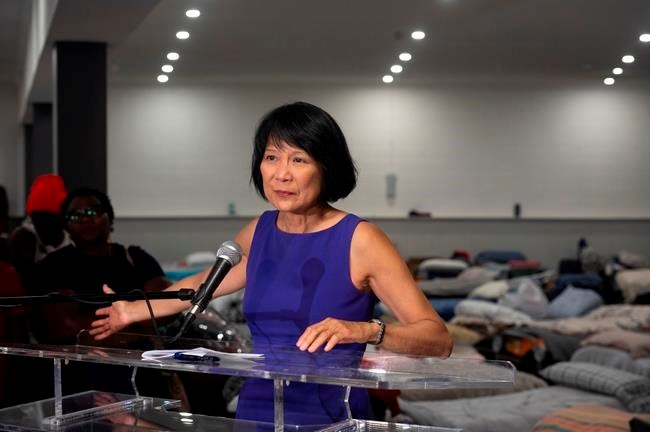TORONTO — Refugee claimants could account for half of Toronto's homeless shelter population by the end of the year, according to a new staff report, a situation Mayor Olivia Chow called "desperate" as she pressed the federal government for immediate support.
The city manager's report was put before councillors Wednesday at a special meeting where they were set to discuss how to manage Toronto's beleaguered financial outlook, with the city set to open its 2024 budget discussions with a $1.5 billion shortfall.
It's an outlook further clouded by the pressing demands of a shelter system already stretched to its limits, where on an average night this summer more than 200 people go unmatched with one the city's 9,000 shelter spaces.
Chow says the refugee shelter crisis is only getting more urgent because the city doesn't have the financial tools to support claimants.
"We are a billion dollars already in the budget hole," Chow said in speech before council on Wednesday. "How are we going to be able to support these refugees properly?"
"Will they be on the street come winter? I don't know. We cannot answer that question. Our staff cannot answer that question. That question depends on whether the federal government will step up and do what it needs to do and not shirk its responsibility."
The report before city councillors says the number of refugee claimants has "dramatically" increased to 3,300 people and could climb by year's end to as many as 4,500 – half the city's shelter capacity.
That does not include the 1,200 claimants getting help from outside the shelter system, including by Black-led churches and community organizations who quickly mobilized in recent months to offer shelter support.
"The situations are just desperate," Chow told reporters ahead of the meeting.
The report recommends council ask the federal government for $200 million this year to help shelter refugee claimants, which would include the $97 million Ottawa already pledged to the city earlier this year.
It echoes previous calls made by council for federal money for a rent subsidy program and to establish a reception centre for newly arrived refugees.
Council voted to set aside $750,000 to compensate the churches and community organizations who have been helping shelter refugees, but to first ask the federal government to cover those costs. The motion was amended to give the feds a Sept. 18 deadline to respond, after which the city would pay.
The federal government has previously said housing for asylum seekers is a provincial and municipal responsibility, but recognized the urgent situation requires an all-hands-on-deck approach while touting some of its recent investments.
The update on the city's refugee shelter issue came before council considered a major report Wednesday from the city manager, exploring several possible measures to get a handle on Toronto's long-term financial outlook.
City manager Paul Johnson's updated long-term financial plan forecasts combined budget pressures of $46.5 billion over the next decade.
New revenue tools up for discussion included a progressive surtax on the sale of homes worth more than $3 million and lifting a $5-per-hour cap for on-street parking meters.
Other options, like a commercial parking levy and asking the province to bring in a Toronto-specific municipal sales tax, would be explored further by city staff before being considered by council.
This report by The Canadian Press was first published Sept. 6, 2023.
-- With files from Tyler Griffin
Jordan Omstead, The Canadian Press



